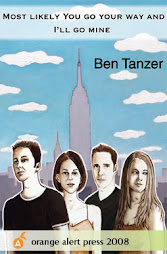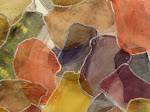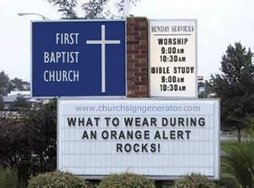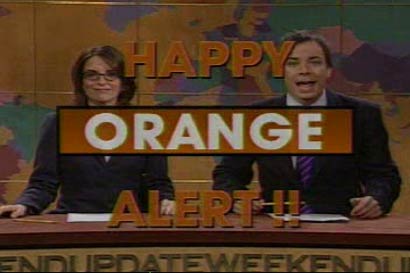 It was Caleb Puckett's word selection that first grabbed my attention, but it was his imagery that kept me coming back for more. It is not the large vocabulary that he posses, but it is more in the way he utilizes his vocabulary. Caleb writes in way that reminds me of the past while mixing in many modern images to create a truly unique product. After reading "Terminus", I knew I had to find out more about this Tulsa, Oklahoma writer.
It was Caleb Puckett's word selection that first grabbed my attention, but it was his imagery that kept me coming back for more. It is not the large vocabulary that he posses, but it is more in the way he utilizes his vocabulary. Caleb writes in way that reminds me of the past while mixing in many modern images to create a truly unique product. After reading "Terminus", I knew I had to find out more about this Tulsa, Oklahoma writer."Elegies entangle the arc of a hard whistle
echoing along the dirty halls of this dimly lit terminal,
and our eyes are annihilated by blood,
teeth crushed by the vinyl lining the length of the hall,
as we waver in and out of chaotic queue,"
Recently, Caleb was kind enough to answer a few of our questions:
Orange Alert (OA): Who are your biggest literary influences?
Caleb Puckett (CP): I would trace my primary lineage as a poet through William Blake, Hart Crane and Philip Lamantia, among others of like persuasion. I enjoy the visionary intensity and deep sense of generative play that informs this particular strain of poetry and pursue some of its properties myself when possible. Each of these poets, in my mind, provides a richly layered, all-encompassing engagement with experience that often eludes the more sober and sanitized versions propagated by their peers. The fact that they eschewed the easy trends of their respective times and still embody a movement unto themselves means that the energy in their work often defies historical or artistic stasis.
As far as short fiction goes, my primary lineage consists of Hawthorne, Dostoyevsky, Kafka and a number of the Magic Realists (starting with Rulfo) who are heirs to this verve of exploration. Again, the visionary intensity of these writers is of great value to me, and I appreciate the focus each has on life’s nearly inexplicable mysteries as they apply to the (de)formation of identity, chiefly when such involves the emotional makeup of society’s ostensible castoffs. All of the artists mentioned above have a wonderful faculty for symbolic construction and, though their sense of diction differs greatly, have an absolute mastery of language in all its atmospheric metaphysical tonalities. Their works have that nice mixture of streaming abundance and stark nothingness that engenders a living texture, a sense of being beyond the scope of typical literary reportage.
Lastly, I must say that the older I get the more I appreciate humorous works of art. Angst has such a prominent place in literature that it often seems to completely overshadow its less brooding brother. The laughs (however innocent or cynical) one can find in James Tate’s poetry or in Flann O’Brien’s writing can do wonders for the weary at heart and help realign the head a bit. Work operating in that capacity certainly appeals to me as much as the well advertised heavy mode does.
As far as short fiction goes, my primary lineage consists of Hawthorne, Dostoyevsky, Kafka and a number of the Magic Realists (starting with Rulfo) who are heirs to this verve of exploration. Again, the visionary intensity of these writers is of great value to me, and I appreciate the focus each has on life’s nearly inexplicable mysteries as they apply to the (de)formation of identity, chiefly when such involves the emotional makeup of society’s ostensible castoffs. All of the artists mentioned above have a wonderful faculty for symbolic construction and, though their sense of diction differs greatly, have an absolute mastery of language in all its atmospheric metaphysical tonalities. Their works have that nice mixture of streaming abundance and stark nothingness that engenders a living texture, a sense of being beyond the scope of typical literary reportage.
Lastly, I must say that the older I get the more I appreciate humorous works of art. Angst has such a prominent place in literature that it often seems to completely overshadow its less brooding brother. The laughs (however innocent or cynical) one can find in James Tate’s poetry or in Flann O’Brien’s writing can do wonders for the weary at heart and help realign the head a bit. Work operating in that capacity certainly appeals to me as much as the well advertised heavy mode does.
OA: How has the internet (websites, webzines, blogs, etc) affected you as a writer?
CP: I really have a lot to say about this subject, especially since I’ll probably be writing a thesis over it in the near future. However, perhaps this short and admittedly simplistic answer will suffice. The Internet continues to have a significant affect on me as a writer. Without its availability, I would be at a definite disadvantage in terms of publishing. My work doesn’t mesh with the standard academic journals and magazines out there and I live in an area that doesn’t offer many alternatives for unsanctioned writers outside of a university setting. With the latter point in mind, although I do serve as an editor for a literary journal here, there is, by no means, a wealth of contemporary, experimental work to be found around the corner. The Internet is an international showcase for such talent and it maintains a thriving, oftentimes DIY community for writers of all stripes who might not otherwise have a chance to share their ideas. In that respect, it helps lessen a localized variety of information poverty while simultaneously inspiring bold ventures beyond one’s immediate range of experience. Like all forms of discourse, it’s a means for knowledge and empowerment, as well as a fruitful end unto itself if it’s used judiciously.
OA: Do you listen to music while you write? Who are your favorite groups or musicians to listen to while writing and in general?
CP: I never listen to music as I write. White noise, whining hounds and the man playing heavy duty tiddlywinks next door are problematic enough until I am absolutely absorbed in the piece at hand. After that point, external movement ceases to register in an immediately recognizable way. However, in just about every other circumstance, especially those involving physical exertion, I listen to music like a fiend. I have a nice range of music at my disposal and make no secret of its sometimes seemingly incongruent application. I may, for instance, cruise off in Gene Vincent’s pink Thunderbird, stop off at the village green to laugh at the Kinks, swing by Radiohead’s Idioteque to check out the paranoia scene, follow Swan Lee and Syd Barrett as they battle homewards, and eventually spend the night somewhere along the Nile, relaxing among Alice Coltrane’s lilting blue harps and bejeweled sarcophagi. I like to shift and shuffle that way.
OA: Why do you write? Is it a release, is it leave a legacy, or does it simple just flow out of you?
CP: Essentially, I write because I am compelled to make a record of my various states and considerations as they play out in the pinball machine that is daily life. Without these points of reference and relation, my sense of humanity becomes cluttered or compromised and I loose sight of the shiny ball that keeps the game alive. That’s not a nice feeling for us sensitive types.
OA: I’ve seen at the end of your published works that you are also a visual artist, where can we see some of your work as an artist?
CP: As you mentioned, I do have some visual art out there, although I must say it’s a pretty miniscule amount. I have a pen and ink drawing in a past issue of MindFire Renewed, a piece of cover art forthcoming in the James Joyce Quarterly (delayed now for how long?) and a collage accepted by Dreams That Money Can Buy. I would really like to submit a much larger portion of my visual work, but my energy has been focused on sending out most of my prose and verse first. Stacks of folders and sketch pads stuffed with drawings and collages congest a corner of my room, so I guess I better get cracking or at least curb my production sometime soon. At least my wife has been incredibly patient with my toppling “archive” of terrors and sarcasms, so I suppose that’s a form of submission and acceptance in and of itself. I’ll take what I can get in that respect.
Caleb Puckett lives in Tulsa, Oklahoma and serves as an English instructor and a librarian, as well as an editor for Nimrod International Journal. He has an M.A. with an emphasis in creative writing and is pursuing an M.L.I.S. degree. His first chapbook, Desertions, is forthcoming this spring from Plan B Press. However, if you can’t wait for spring or don’t anticipate having much spare change by the time the lilacs breed, you may read the poems from Desertions in any number of online journals (Hoboeye), and magazines (The Shore Magazine).
+by+Nick+Volkert).jpg)





















No comments:
Post a Comment